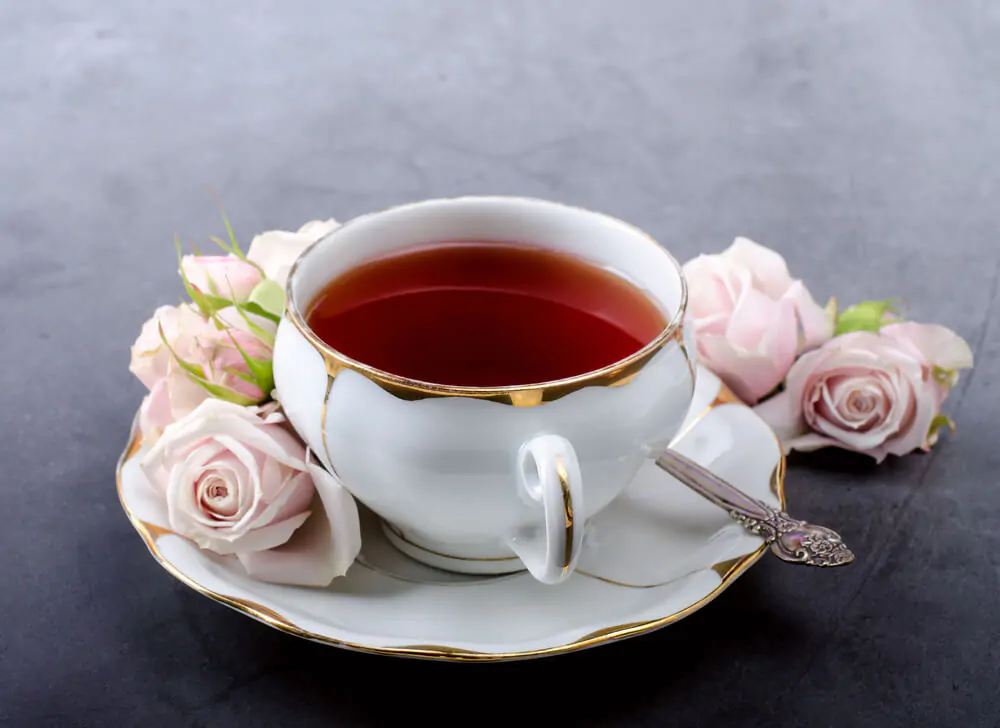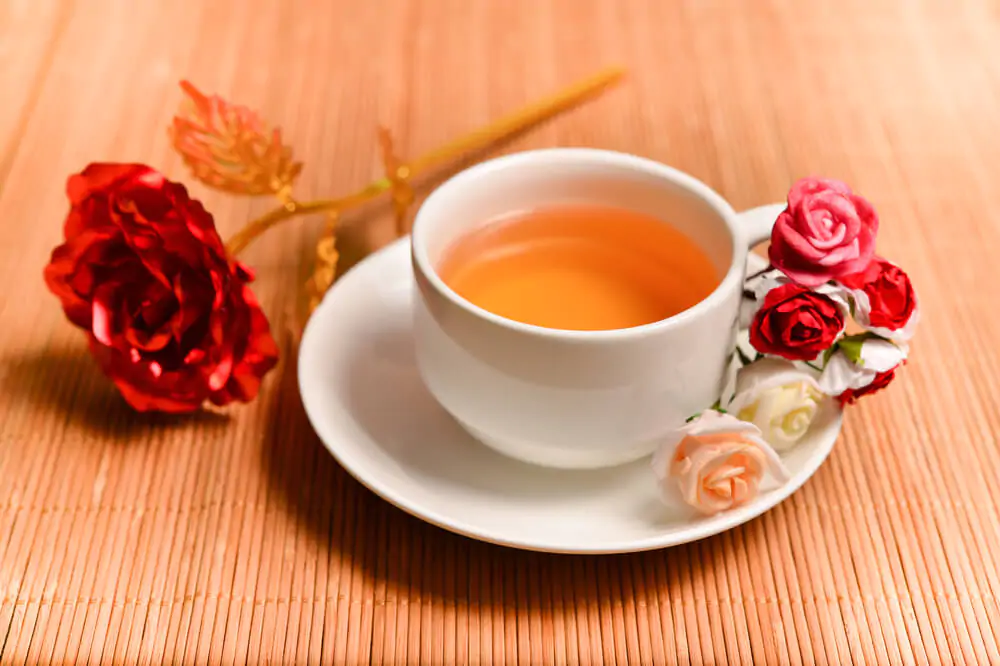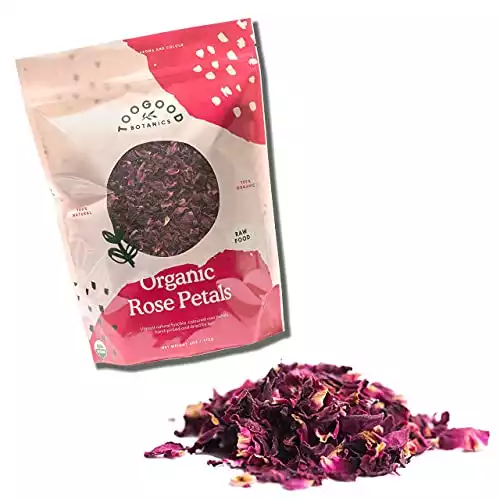Roses are more than just a memorable gift for your loved ones. Read on to find out what is rose tea, the health benefits it offers, and how to brew it yourself.

When you read the word rose tea, I can guarantee it’s how you imagine it. It’s a colorful, fragrant herbal drink made by steeping the aromatic rose petals and flower buds with water and is best served hot. As a result, it has a light floral flavor and is often enjoyed for its purported health benefits.
You can trace its origins back thousands of years ago, notably in China during the Han Dynasty. Rose tea was a traditional medicine to treat common digestive ailments.
The popularity of rose-based foods and drinks has grown since December 2020.
Roses And Rose Tea
The history of roses is long. Fossil records show that roses have existed for at least 40 million years around the globe. The Chinese were perhaps the first to cultivate roses as early as 2700 BC. Historical records of roses come from a Mesopotamian cuneiform tablet account of King Sargon I of Akkadia (2684-2630 BCE) transporting rose saplings to a location most likely in present-day Turkey.
Assyrian tablets not only tell about roses but about rose water. However, the small quantities that they describe (as little as .2 grams) illustrate how precious it was at that time.
By the time of the Roman empire, cultivated roses had become more common throughout the Roman Empire and Middle East (where rose petals and rose water is a common part of the cuisine).
While there’s no specific evidence to indicate who was the first to make rose petal tea, it’s likely to have been around for a very long time.
The rose’s unique beauty made them a popular flower, but the delicate flavor of the petals also made them a beloved ingredient for tea.
How To Make Rose Tea

Making rose tea is a straightforward process. Let’s review each step to help you brew efficiently and confidently.
1. Find Rose Petals
To start, you’ll need to acquire some rose petals! If you have rose bushes at home, you can walk out into your garden and pluck a flower to use for your tea.
However, if you don’t have immediate access to rose petals, you’ll likely need to order some online. It’s crucial to choose food-grade rose petals, as petals found in local flower shops or online floral stores may contain pesticides and preservatives.
Dried food-grade rose petals may not look as aesthetically pleasing as fresh ones, but they’re far less likely to contain harmful chemicals. TooGood Organic Dried Rose Petals are an excellent option, as they’re GMO-free, additive-free, and preservative-free.
- USDA Organic
- Dried Rose Petals
- Food-grade
- Non-GMO
- Vegan
2. Steep In Boiling Water
Now it’s time to brew your rose tea. You’ll want to add a teaspoon of rose petals to your tea strainer, add boiling water, and wait for five minutes.
3. Brew And Enjoy
Once your rose tea has finished steeping, you can also add a pinch of sugar or a few drops of honey.
What Does Rose Tea Taste Like?
A friend gave me a gift of rose tea years ago, and the taste was so special that I would only allow myself to drink it on special occasions. Many describe rose tea as slightly sweet, very floral, and somewhat fruity. For me, it tastes exactly like roses smell.
Rose Tea Is Caffeine Free

Rose tea is an alternative for those who can’t endure the side effects of coffee for a prolonged period. If you’re trying to minimize your coffee intake, this is the perfect beverage for you.
If you are getting rose tea from the grocery store, you need to pick the caffeine-free 100% rose petal tea. Some selections contain caffeine due to the number of tea leaves added and the type used. Learn more in our guide on how much caffeine is in your cup of tea.
Rose Tea Is Rich In Vitamin C And Antioxidants
Let’s face it; we’re not getting any younger. Our body takes a toll as we age, but tea can provide additional nutrients.
Rose tea contains Vitamin C, an essential part of our immune system that helps the body fight off several infections and diseases. The petals also contain antioxidants like polyphenols that reduce the risk of several types of cancer, heart disease, and degenerative diseases, to name a few.
Research shows that even the smell or aroma of rose tea can reduce your stress level. It’s listed as one of the best teas to help you relax for a good reason!
It Helps With Menstrual Discomfort
To rephrase a famous slogan, “you’re not you when you have menstrual cramps.”
Although more research is needed to support the claim, regular drinkers can attest that rose tea helps regulate your hormones and ease pesky cramping and mood swings.

A study exploring the effects of rose tea on 130 Taiwanese female students found those who drank two cups of rose tea for twelve days reported less pain and improved psychological well-being. The students started drinking the tea one week before their period began.
FAQs About Rose Tea
Below you’ll find the most frequently asked questions concerning rose tea. If you have any further questions, you may find your answer below.
Does Rose Tea Make You Sleepy?
Like chamomile tea, rose tea is proven to help with relaxation and stress reduction. While these effects can make it easier for you to drift off to sleep, they can also help lessen feelings of anxiety. As such, rose tea is best consumed directly before bedtime or during times of high stress.
Is Rose Tea A Detox?
Rose petals have antibacterial and antifungal properties. These qualities make rose tea a natural detox drink that can help replenish healthy microorganisms in the gut while flushing out potentially harmful toxins.
If you liked this article check out What Is Ginger Tea.


